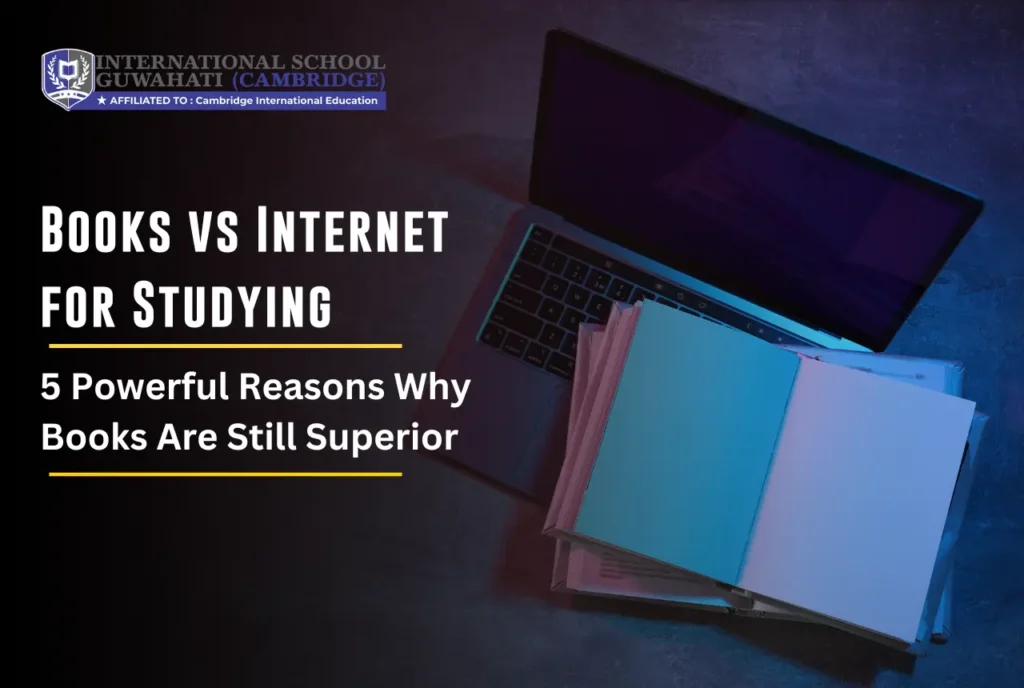![]()
Introduction
Books vs Internet for studying? Is the internet really the best tool for studying, or are traditional books still unbeatable? In today’s digital society, information is just a click away, so that is exactly where the modernist heads these days in order to find quick answers. Endless resources dwell right at the user’s fingertips, and it is easy to rely on digital content for learning. Yet does it provide the same depth and focus as books?
This debate about using books vs internet for studying during examinations has been on for a long time, especially with advancements in the ICTs. As convenient and accessible as the internet may seem, it always leads to divisiveness and superficial learning. The comfort allowed by the internet is, in no way, good enough for profound, intensive learning at all times.
Furthermore, an actual book offers a reading environment that fosters deeper understanding and retention. Books in their physical version create a much deeper investment in the work that is being read and allow for streamless studying devoid of many of the disturbances on other digital devices’ notifications.
In this article, we’ll explore 5 powerful reasons why books still hold an edge over the internet for studying, even in 2024.
Books vs Internet for Studying: A Comprehensive Comparison

This has brought about much debate on books vs internet for studying or learning: the positives and negatives of each.
Books are traditional and reliable sources that provide rich, well-developed content. They engage readers physically, with an integral active learning and retention capacity. Since they are of structural nature, books can offer better knowledge of complex topics.
The internet is fast to access an enormous number of sources and interactive materials. This is an extremely useful tool for quick research, though it suffers in reliability and depth. The availability of such a great deal of material on the internet can be spoiled by the presence of advertisements, and social media alerts, among other distractions that prevent focusing on studying.
Both have their merits, but when it comes to deep learning and concentration, books are the superior choice. They offer uncluttered space to study in, free of the distractions that assail digital media.
Table: Books vs Internet for Studying – A Point-by-Point Comparison
| Criteria | Books | Internet |
| Knowledge Availability | Properly thought and well-organized, richly researched Subject Matter | Readily accessible but potentially shallow or incomplete |
| Focus & Concentration | Improves focus without distractions | There are so many distractions like ads, media etc. |
| Authenticity & Validity | Published, peer-reviewed, edited content | Mixed quality, not always reliable sources |
| Physical Engagement | Tactile, support better retention through active reading | Consume passively, which may tend to skim |
| Distraction-free Learning | Minimal external interference | Compulsive use of multiple applications, and various notifications |
Reason 1: Books Promote Better Focus & Concentration

The huge benefit of studying with books is the opportunity to be able to be completely absorbed in the material without distractions like advertisements and pop-ups that come with digital platforms.
Studies indicate that students pay attention better when reading from the book rather than from the internet pages.
A study has revealed that individuals reading from the computer screen tend to browse instead of reading thoroughly. Skimming is one of the behaviors that impact the depth of understanding and remembering the points. For instance, students who used textbooks scored a hundred percent on comprehension tests compared to students who only relied on online articles.
Reason 2: Books Offer Higher-Quality, Curated Information

Books are peer-reviewed and edited by experts in their fields before they are printed. In contrast, there is much information unverified online. Much of this can lead to people being misinformed.
In difference, books vs internet for studying, books are preferred more because books are published textbooks with comprehensive in-depth knowledge and edited information. This really shows quite a contrast to the user-generated content that usually appears on blogs or forums, which usually lose merit towards credibility. There really is a marked gap between a published book and articles appearing online; books will offer a level of trustworthiness missing in these digital forms.
Reason 3: Books Foster Deeper Cognitive Engagement

The physical nature of books is quite tangible, to the extent that their physicality promotes cognitive engagement. Turning pages, underlining a piece of text, and then making some notes are activities related to book interaction that definitely lead to better retention of information rather than for a screen-based medium. Studies show that students provide significantly better comprehension when they are working with more physical materials than with digital.
This means that the reader is more likely to suffer from screen fatigue and not become immersed in what’s being read. It is, in fact, the physical act of ‘using’ the book that provides a much deeper learning experience from which other digital versions of books will find it hard to surpass.
Reason 4: Books Encourage a Healthy Reading Routine

Also the debate on books vs internet for studying shows that as a starter, physical books encourage routines of the mind for reader. Being able to tell the number of pages or chapters in a book instills discipline as well as direction of focus.
More about physical books: One will take more time to study if using physical books and avoiding all distractions while navigating them, as opposed to making use of online resources. The time spent studying can be scheduled in a proper manner using physical books, thus increasing learning and consistent study habits over time.
Reason 5: Books Reduce Eye Strain & Support Long-Term Health

Digital screens take a lot of time to view and result in severe eye strain, headaches, and poor posture factors that affect the efficiency of studying. In recent data, however, spells growing apprehension about digital screen time among students, stating negatively about its relationship with health.
On the other hand, reading physical books provides a healthier alternative when one has long study periods. It minimizes health-related distractions associated with screen use, and results over the long term would be more effective.
Conclusion
Altogether, despite the values of both books and the internet in study aid resources, this article has discussed some reasons why books are better for deep and focused learning. These resources help improve one’s ability to concentrate, provide good information, engage the mind, promote regular studying routines, and add to long-term health factors in what is considered a distracted digital world for today’s students. Adding books to your study routine will make studying much more effective, so pick up a book and get at it!
Further books vs internet for studying teaches us that physical books provide a sensory experience that results in better retention and understanding. Flipping pages and marking important points will allow a person to utilize more of their senses and thereby better retain information with more facility when recalling.
It is not as tempting as sitting at a computer to open the book in your hands and begin reading without the temptation of notifications and pop-ups. Properly focused reading periods lead to a more satisfactory understanding of material; if this happens, it would lead to more effective critical thinking and analysis. Thus, in the pursuit of academic victory, do not downplay the power of a good book to enhance your learning journey.










